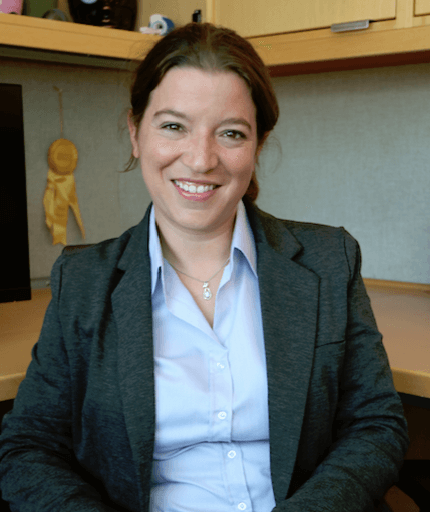
Interview with Myriam Chaumeil by Alexa Rocourt
Q: In a couple sentences, tell me about what you do in your work.
We are developing better and faster ways to image the brain and the way it works using new MRI methods, in order to improve patient care. The technology we use is called (hyperpolarized C13). UCSF was one of the first institution in the world to start using it, which is why I came here.
In my lab, one of our focus is Traumatic Brain Injury, in collaboration with Professor Rosi. When you get hit on the head, like after a fall for example, and go get an MRI, doctors look at it and tell you that you have a concussion. But whether it will have a consequence in the long-run is impossible to tell using regular MRI. If you get multiple concussions at a young age, you have more chances to develop cognitive issues, and more chance to get diseases such as Alzheimer's.
So our goal is to improve MRI methods, in order to image the way the brain works better and to better diagnose people and assess their risks of developing dementia. We also work on improved methods to better detect Multiple Sclerosis, so that patients can receive the best possible treatment.
Q: What’s your favorite part about being a scientist?
Creativity. And the luxury to do something new everyday. I feel like I’m learning all the time, which is awesome.
Q: What have you created or discovered that you are most proud of?
When I started here as a PostDoc with Prof. Ronen, we started working on a new MRI technology that allows you to better image brain tumors. The work we did over 3 or 4 years really paved the way for the first clinical trials and patients of the technology. Doing work that impacts patients in the long-run was really inspiring.
Q: At the end of the day, why does your work matter?
What we are trying to see is how big the hyperpolarized 13C technology can grow and how much we can impact people with it. My lab focuses on imaging of the brain, while others focus on other parts of the body. We want to know if and how we can impact medical practice.
Q: Outside of work, what do you do to relax?
I grew up in a really small village of 10 people, so I am an outdoor person. I go out camping or hiking every other weekend at least; being outside is how I relax In our job, there’s always something think about. I love my shower time in the morning, it’s a great time to think about projects and how to solve problems... I make sure to take some time off to clear my head. For example, this weekend I’m camping for 3 days in an area with no cell-phone reception
Q: What situation do you think you’d feel the most out-of-place in?
Small talk! I’m not really comfortable talking to multiple people in a large setting, like at networking events. I’d rather have one long and interesting conversation with one person than 10 short conversations with 10 people.
Q: In 100 years, what do you want to be remembered for?
Woahh, good question. I think it would be great if my scientific contribution was recognized as part of the larger international effort of understanding what we can do with the hyperpolarized 13C technology. I would love to bring my own piece to the puzzle, imaging the diseased brain in neuroinflammatory pathologies, I want to be part of the amazing team of people that are pushing the envelope of what this new imaging method can do. If I could be named in that list, I would be grateful. I also want to be remembered as a fun and nice person to work with!